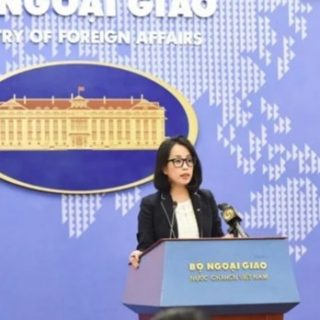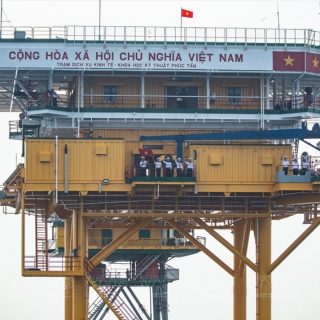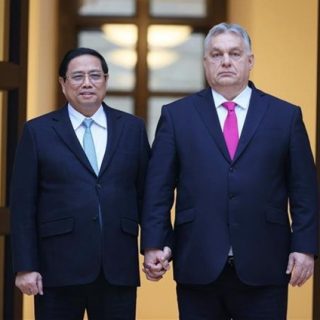A group of four allied nations – Australia, India, Japan and the United States – intends to maintain open access to the South China Sea for international use, despite China’s growing control. These countries will probably make tough claims to help China’s maritime rivals, and hold joint naval exercises near the disputed waterline in 2018.

(USS Carl Vinson aircraft carrier)
Australia, India, Japan and the United States are likely to adopt these measures rather than directly challenge China’s activities, such as Beijing’s deployment of military facilities in the region of 500 small islands in the South China Sea.
Professor Stuart Orr, who specializes in strategic management at Deakin University in Australia, said: “First, active presence may be driven by the United States, followed by India, whereas Japan plays the same role as Australia – providing advanced logistics support. ”
The quartet wants to keep the resource-rich marine area of 3.5 million square kilometers open, while maintaining economic ties with Beijing, experts say. Many countries are still traveling, fishing and exploring oil and gas in the South China Sea.
In November, the four coalition leaders met in Manila to discuss keeping the openness in the South China Sea. Australia and Japan then in turn called for a “law-based order” and “respect international law “in the South China Sea.
Indian Prime Minister Narendra Modi told leaders from 10 Southeast Asian countries, including four countries in dispute with China over territorial waters, that India is committed to work with them on maritime issues.
Ben Ho of the Military Research Program at Singapore’s S. Rajaratnam School of International Studies, said: “The most practical thing they can do is to issue some statement on the South China Sea dispute. I do not think they will name China specifically in such a statement. ”
Experts say the combination of the four nations could be achieved by bringing naval ships to the South China Sea, particularly along the coasts of smaller nations that want to fight Chinese ships.
The United States, the world’s leading military power, has deployed naval vessels to the South China Sea five times under President D. Trump, extending its predecessor’s activities to affirm Washington’s views on freedom of navigation in the South China Sea. On the issue of securing maritime security in the South China Sea, Daniel Russel said the United States has been and will continue to deploy forces to international waters in the South China Sea, deploy carriers and even F35 fighters. The purpose of this expedition is to encourage small waterways to travel freely in international waters without fear of any “bullying” forces. However, Russell noted that the United States continued to hold neutral in the face of the territorial disputes in the South China Sea. The United States will not be involved in judging “to whom the island belongs,” but instead the United States is concerned only with international norms and laws. The United States wants countries, especially powerful ones (in particular China) to respect international law, to ensure a stable environment in the South China Sea.
Oh Ei Sun, an associate professor of international studies at Nanyang University in Singapore, said Japan might follow the United States as it tries to “get rid of self-imposed restrictions”.
Tokyo commissioned a prototype helicopter to cross the disputed waters in June 2017. Japan also challenged China on the islands of the East China Sea. Tokyo’s leaders are working to change the constitution so that the armed forces have more power. “You will see Japan trying to make port visits more often and actually take part in military drills, training, or similar things for countries,” said Professor Oh.
Analysts also say India and Australia will also support any military move to alert China. According to Professor Orr, Australia can become a place to keep track of “what’s happening” and update information.
According to Sameer Lalwani, deputy director of the South Asian Program at the US-based Stimson Research Center, India will conduct port visits and participate in any naval patrols. India is competing with China for geopolitical control in South and Central Asia. “India can also increase the number of military exercises, both at national level and with other countries, to improve its capabilities, strengthen cooperation and signal capabilities,” Lalwani said. Greater cooperation with the United States will send a stronger message”.
Professor Stephen Nagy, who studied politics and international studies at Christian International University in Tokyo, says that Japan will “continue to improve capabilities of Asian allies. New equipment and two naval destroyer will be deployed to Vietnam this year, as a message of deepening ties between the two countries.”
Vietnam is considered the most active nation in the South China Sea dispute with China. Nagy said: “As the United States deploy ships to Vietnam, Vietnam and other countries are invited to cooperate on security.”
According to experts, India has previously helped Vietnam to explore oil and gas. This country can rely on the quartet to have the opportunity to develop economy, technology and diplomatic relations.
China’s response
Ho said China is expected to react to the quartet’s actions at the same time. If these countries make a statement, China will use words to retaliate. If the countries hold military exercises, China could double the consolidation of the islands that Beijing holds in the Paracel and Spratly Islands chain.
Still, according to Ho, it is unlikely that India and Japan will accelerate the problem in general as they have to deal with their disputes involving China. India and China are disputing two areas in the mountainous border.
China’s main threat to the “Quartet” may be economic potential. For example, Australia regards China as its No. 1 trading partner, with exports rising by 27% in 2016 and 2017. Therefore, a naval exercise is unlikely to happen. “Canberra has too many economic links with Beijing to take such a strong measure. Ultimately, China remains Australia’s leading trading partner, both in terms of imports and exports, and Canberra will not do anything drastic to harm the relationship”./.
An Phan

Aufrufe: 116

 Deutsch
Deutsch Tiếng Việt
Tiếng Việt





